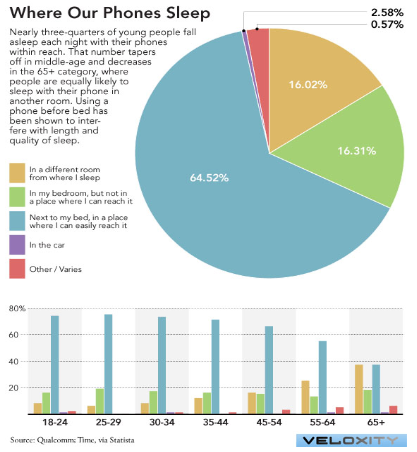How Cellphones Can Affect Your Sleep
January 14, 2014 | By The Veloxity Team | No Comments">No Comments
As an alarm clock, a sleep-cycle tracker, or simply a source of information, mobile phones are used from dawn to dusk; literally from when users begin their day to the moments before they hit the sack. According to a 2012 Time Mobility & Qualcomm poll, about three quarters of mobile users between the ages of 18 to 44 fall asleep with their phones within reach; close to 85 percent of respondents within the same age groups fall asleep with their phones somewhere in their room.
We can infer from this study that it has become psychologically impossible (or at least tremendously difficult) for users of the last three generations to ever be ‘unplugged’, discounting the few hours they actually spend sleeping. Even when they are asleep, users unfortunately aren’t snoozing as deep as they would be if their phones were not within reach. Sleep quality suffers.
“If your phone wakes you up in the morning, it may also be keeping you up at night.”- a study funded by the Mobile Manufacturer’s Forum (a group comprised of the world’s largest phone makers such as Nokia and Motorola) revealed that participants exposed to mobile radiation took longer to fall asleep and spent less time in deep sleep. The study concluded that mobile phone radiation can cause headaches and interrupt sleep patterns vital to the body’s recovery from daily wear and tear. “LED lights like those in phones and computers were ‘typically more disruptive’ than standard electric light bulbs,” as confirmed by Harvard Professor Charles Czeisler. In addition, mobile phone radiation can even trigger headaches, mood swings, and mental dissatisfaction.
We hate to inform you that your routine ‘last look’ at your messages, apps, or the web makes it harder for your mind and body to wind down and induce sleep, rendering you less refreshed the following morning. In turn, this lack of sleep can also lead to mood swings and even obesity and heart disease in the long run. Visual consumption of electronic displays suppresses melatonin levels in the brain- a natural hormone and neurotransmitter that tells our bodies that we’re tired.
As someone who sleeps with my phone in bed, I know first hand how hard it is to put it down at night. Today people always want to stay connected to the latest gossip and news. I find myself refreshing my apps again and again while I am passing up on much needed sleep. Following the tips listed below I hope to be able to put down my phone and get a better nights sleep!
That said, what are some ways to help you fall asleep and stay asleep longer?
-
Turn the brightness all the way down on your phone
-
Hold your phone at least 12 inches away from your face when you use it before bed.
-
Check your last email or text at least 15 minutes before going to sleep (read or listen to relaxing music instead! )
These tips will help you get more out of your well-deserved beauty sleep and get more done out of your day- because productivity matters!
Stay Connected, and sleep well. The Veloxity Team

